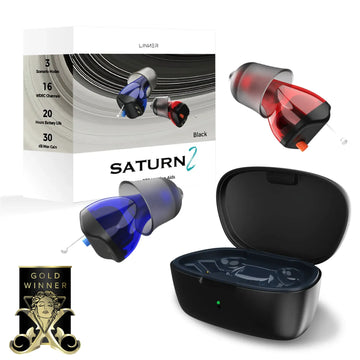Hearing loss is a common condition that affects millions of people around the world. It can be caused by a variety of factors, including genetics, aging, and exposure to loud noises. In the past, the only option for individuals with hearing loss was to obtain a prescription hearing aid from a licensed audiologist or hearing healthcare professional. These devices are customized to the specific needs and preferences of the individual, but they can also be expensive and may not be covered by insurance.

The recent passage of the Over-the-Counter Hearing Aid Act of 2017 has changed the landscape for hearing aids in the United States. This act allows for the development and sale of over-the-counter (OTC) hearing aids, which can be purchased directly by consumers without a prescription. OTC hearing aids are intended to provide a more affordable and accessible option for individuals with mild to moderate hearing loss.
One brand of OTC hearing aids that has gained popularity in recent years is LINNER. LINNER hearing aids are small, wearable devices that are designed to amplify sounds in order to improve hearing. They are typically worn in the ear and can be adjusted for different levels of hearing loss. LINNER hearing aids are known for their affordable price point and high-quality sound, making them a popular choice for individuals with mild to moderate hearing loss.

What Are OTC Hearing Aids?
OTC hearing aids, like LINNER hearing aids, are small, wearable devices that are designed to amplify sounds in order to improve hearing. They are typically worn in or behind the ear and can be adjusted for different levels of hearing loss. OTC hearing aids are typically less expensive than traditional prescription hearing aids and are intended for people with mild to moderate hearing loss.
These devices typically do not offer the same level of customization or advanced features as traditional prescription hearing aids. They may not be suitable for individuals with severe hearing loss or those who have underlying medical conditions that could impact their hearing. OTC hearing aids, including LINNER hearing aids, may also not be covered by insurance.
Who Is Recommended to Use OTC Hearing Aids?
OTC hearing aids, such as LINNER hearing aids, are recommended for adults with mild to moderate hearing loss who do not require the advanced features or custom fit of a traditional prescription hearing aid. These devices can help individuals with hearing loss improve their communication and overall quality of life.
However, it is important to note that OTC hearing aids are not a substitute for professional audiological care. If you are experiencing hearing loss or are unsure if an OTC hearing aid is right for you, it is recommended to consult with a licensed audiologist or hearing healthcare professional. An audiologist can help you determine the cause and severity of your hearing loss and recommend the most appropriate treatment options.

Why It’s Smart To Pick OTC Hearing Aids Especially LINNER Hearing Aids
The availability of OTC hearing aids, including LINNER hearing aids, provides a more affordable and accessible option for individuals with mild to moderate hearing loss who may not have been able to afford or obtain a traditional prescription hearing aid. These devices can help people with hearing loss improve their communication and overall quality of life.
However, it is important to remember that OTC hearing aids are not a one-size-fits-all solution. If you are experiencing hearing loss, it is important to seek the advice of a licensed audiologist or hearing healthcare professional to determine the most appropriate treatment options for your specific needs.


![Linner Mercury Clarity OTC Hearing Aids [FSA & HSA Eligible] Linner](http://www.linnerlife.com/cdn/shop/files/Linner-Mercury-Clarity-OTC-Hearing-Aids-_FSA-_-HSA-Eligible_-Linner-110038953.webp?v=1725853434&width=360)

![Linner Mars OTC Hearing Aids [FSA & HSA Eligible] Linner](http://www.linnerlife.com/cdn/shop/files/Linner-Mars-OTC-Hearing-Aids-_FSA-_-HSA-Eligible_-Linner-110039213.webp?v=1725865495&width=360)
